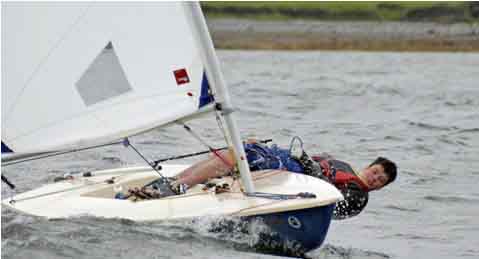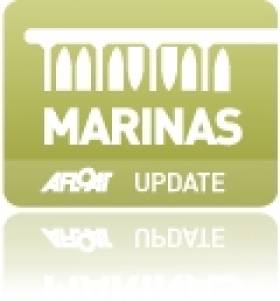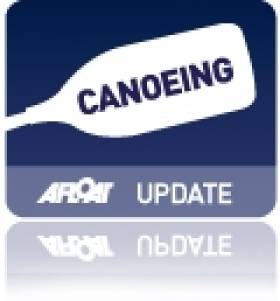Displaying items by tag: Rosmoney
Rosmoney Quay Marina. Yacht & Boat Berths & Storage in Mayo
This important new potoon facility on Clew Bay is located approximately 30 metres from the edge of the permanent pier will allow users of the pier to board and disembark from their boats in a convenient and safe manner.
Mayo Sailing Club, islanders, boatmen and County officials gathered at Rosmoney Pier for the opening for public use of the new floating Pontoon at Rosmoney in April 2013.
Rosmoney near Westport is the base for the Mayo Sailing Club whose members enjoy the excellent sailing grounds that exists among the archipelago of islands in the east of Clew Bay.
Rosmoney is located 8km from Westport town and adjoins Clew Bay. Rosmoney Bay is currently the centre of access to Clew Bay for a wide number of users. Currently there are over 100 marine craft of various descriptions moored in Rosmoney.
The pontoon is made up of a floating pontoon and ramp with safety railings, a water source and power facilities which makes it possible for boats to moor at Rosmoney including local fish farm vessels. Islanders will be allowed to tie their boats to the pontoon while on business on the mainland while other boat users are to use it for loading and uploading.
UL Take Title at Irish Kayaking Intervarsities
#KAYAKING - The University of Limerick were overall winners in the 2012 Irish Kayaking Intervarsities at GMIT Castlebar last weekend.
As the Mayo Advertiser reports, some 500 students were on hand for the three days of competition, which kicked off with canoe polo on Lough Conn (won by GMIT over DCU).
Saturday's action saw the whitewater contest on the Clydagh River, with Limerick emerging on top, and the freestyle event on the River Clare at Tuam Wave.
Sunday closed with the long distance event at Lough Lannagh, which clinched the weekend for UL's kayakers.
Mayo also hosted the Irish Intervarsity Sailing Championships in Rosmoney last week, which attracting 200 students to the Westport area.
Mayo Sailing Club

Established in 1976 to promote sailing in Clew Bay and the West of Ireland, Mayo Sailing Club (MSC) has earned a solid reputation in both cruising and racing. There are currently more than 250 members taking part in various on- the-water activities during the season. Activities include a youth sail training programme, dinghy racing, cruising boat racing, and cruising. On the competitive racing front, members have taken part and performed at the top of class in open events along the west coast and beyond, including the Round Ireland Race and the World Student Yachting Championships. On the cruising front, many members actively cruise the challenging waters of the West coast, while more adventurous souls venture to Europe, across the Atlantic, around the world, and even to the remote regions of the Arctic and Antarctic. Training on these local waters of the wild Atlantic prepares intrepid MSC sailors to sail anywhere.
With a beautiful clubhouse that has stunning views on the shores of Westport Bay, MSC offers sheltered moorings, a pontoon laid on with water and electricity, a slipway and hardstand, boat shed for storing outboards and other equipment, a secure area for stowing dinghies, bar and social room open on race days, comfortable changing rooms with toilets and showers, as well as three rescue boats and one race committee boat. Located just 10 minutes from Westport town.
Since its establishment Mayo Sailing Club has earned a good reputation in both cruising and racing.
There are currently 250+ members, with 33 cruiser/racers, five adult dinghies and 25 junior dinghies all taking part in activities during the season.
From regular summer cruising along the west coast and its islands, to wilderness expeditions to the Antarctic and Artic, members have demonstrated their enthusiasm for sailing. On the racing front members have been to the fore in open events along the west coast arising from the very competitive club racing which has evolved at home at MSC
Activities
MSC moved to Rosmoney in 1983, and from 2008 can offer its members during the season (April to September, except for adult dinghies which starts in January):
– A beautiful new Clubhouse
– Junior sail training and racing each summer
– Class 1, Class 2 and Class 3 cruiser racing Thursday evenings and Sunday afternoons (Five Race Series)
– White Sail Fun Races
– Pursuit Races
– Introduction to sailing courses Tuesdays in May
–Flotilla cruise to Boffin August Bank Holiday, and various cruises and rallies during season,
– Annual club regatta August with Commodores Mid-Summer Ball [Black Tie]

Club facilities at Rosmoney
– Comfortable changing rooms, toilets and showers
– Bar and social room
– Boat shed for storing outboards, etc. (strictly controlled)
– Club slipway and hard stand berthage
– Access to moorings
– Three rescue boats and one race committee boat
– A fleet of junior sailing dinghies for use on the very popular junior sailing courses include four Mirror sailing dinghies and two Optimist sailing dinghies
Contacts
Damien Cashin, Commodore – 087 245 0123 – [email protected]
Paul Murphy, Vice Commodore – 086 839 0581 – [email protected]
Donagh Waldron, Hon. Secretary – 087 2474811 – [email protected]
Mary Walsh, Hon. Treasurer – 086 837 1669 – [email protected]
Cathal Geoghan, Hon. Sailing Sec – 087 797 5627 – [email protected]
Peter Quigley, Junior Organiser – 087 638 9010 – [email protected]
Gerry Daly, Rear Commodore – 085 174 1942 – [email protected]
Paddy Alyward – 087 236 4833
David Baird – 087 236 2124
Boyd Gale – 086 226 3319
Hugh O'Donnell – 086 069 6159
Una Quigley – 087 245 2921
Declan Ruddy – 087 272 6616
James Fitzsimons – 087 230 4331
John O’Brien – 087 241 5664
(The above details and images courtesy of Mayo Sailing Club)
Mayo Sailing Club, Rosmoney, Co. Mayo
Have we got your club details? Click here to get involved






























































